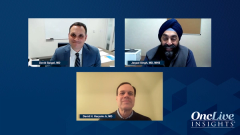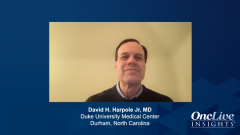
Unmet Needs and Future Perspectives in the NSCLC Treatment Landscape
Looking to the future, a panel of experts offer closing remarks on promising developments and unmet needs in the treatment of NSCLC.
Episodes in this series

Transcript:
David Spigel, MD: I’ll finish our session by going to both of you, starting with Dr Singh. Maybe you could say where you think the next big advances will be made, whether they’re diagnostic or therapeutic, in early-stage lung cancer.
Jaspal Singh, MD, MHS: There’s a lot of excitement in the pulmonary world about mixing diagnostic and therapeutic at the same time. For example, could that first patient who we discussed have a localized therapy delivered at the time of the diagnostic procedure, or make things super easy for the surgeon to go back? There’s a lot of interest in marking the area for a minimally invasive surgery, especially for stage I and early cancer.
As I said, there’s the aspect of following diseases chronically and figuring out surveillance regularly. What does pulmonary survivorship look like from the multidisciplinary perspective? We need to start thinking through how to survey. If something does rear its head later, do we treat it differently in future paradigms? How will that look? Would it be minimally invasive up front? Would it be longer term and we keep things in our hip pocket as the technology advances? Those are things [to think about].
From a population perspective, we have to assume that the majority of the country is not treated in major cancer centers. The majority of the country is treated in their community. When you think about it like that, leaning on other people [is important]. Let’s figure out ways by which individuals can get real-time expert advice that works and can provide some degree of team-based care in a safe, nurturing, and encouraging setting. I’m saying that because there are a lot of common principles of leadership, of convenience. How do you use data and other communication channels to optimize patient care? [How do you] minimize biases and provide meaningful, real-time decision-making? [We need to] equip that in the space no matter where a patient is, whether it’s the emergency department, the hospital setting, an urgent care facility, or in an office somewhere remote from a large team that’s fully equipped. How do those teams reach out and create clear networks, guidelines, and pathways? That’s an interesting innovation: how do we deliver high-quality care to remote sites in real time?
David Spigel, MD: I love that. Technology and our ability to do an education session like this, where we can communicate with colleagues across the country, shows us that we can do that. David, what are your closing thoughts on the next big thing? You mentioned 1: the VALOR study. What do you think is going to be the next big step forward in early stage care?
David H. Harpole Jr, MD: There are several interesting things. I’m looking at combination immunotherapy because, as great as it is, the vast majority of patients don’t benefit. It would be nice to convert them to immunologically active tumors. Second, we’re enthusiastic about these basket trials, where we can take patients and assess them in an adjuvant fashion and fit them into trials for all of these—you mentioned BRAF—rare mutations. [They could] potentially benefit from adjuvant therapy, but because of the minimum number of patients, any one site is not going to be able to run these trials. That’s a great new paradigm: to learn a lot about these potential novel therapies in a handful of patients who have the correct target.
David Spigel, MD: That’s great. It speaks to what Dr Singh was talking about. We’re a global community, and collaboration is going to help us get answers sooner. I want to thank everybody for attending. This was a lightning round through a couple of real-world cases in early-stage lung cancer. It’s fun for me because when we started, stage IV care was rightly what we focused a lot of our research efforts on. It’s great to see that we’re talking about advances in early-stage cancer, hopefully leading to even more cures for patients. Thanks for taking the time to attend this.
Transcript edited for clarity.







































